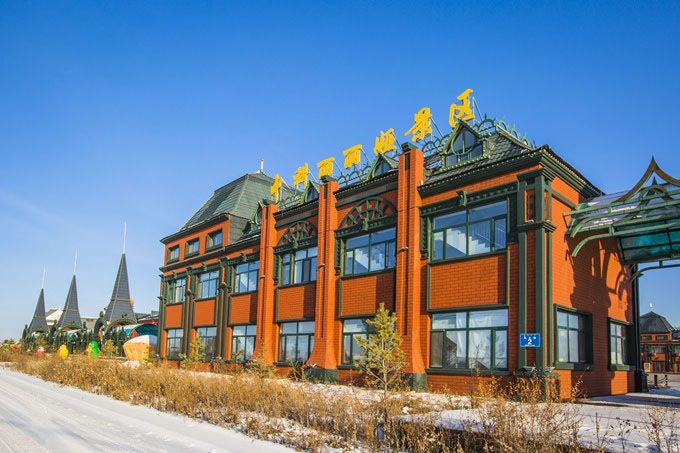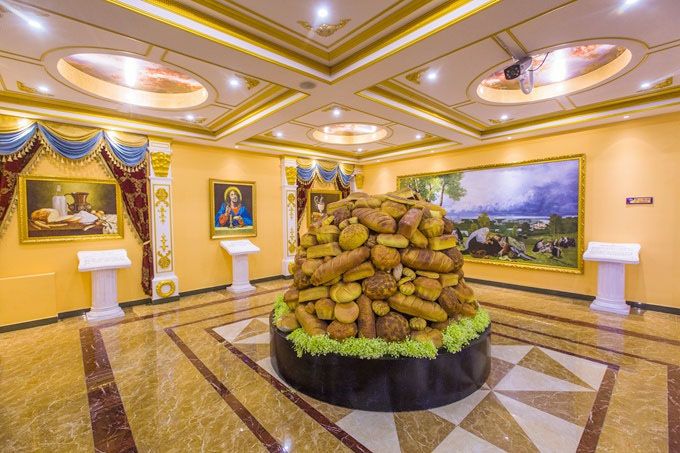
As the northernmost border city in China, Erguna in Inner Mongolia has two completely different faces. Here is the hometown of Genghis Khan, one of the greatest conquerors who ever lived. The Mongolian herdsmen’s yurts are scattered across the grassland, here is the closest place to the “fighting nation” Russia, there are also many rural houses that fill Europe type amorous feelings.
With the round-trip of the China-EU train, more and more special products and delicious foods from countries along the routes have entered the daily lives of the ordinary Chinese people. These extremely rare goods in the past are now available in supermarkets. Among them, Russian cuisine is popular now, such as Russian bread.
For the Chinese, Russian bread is a healthy, filling and delicious food. Like the Russian nation, the sturdy and rugged food has a lofty symbolic meaning in Russia. It is a symbol of the holy body of Jesus, representing respect, friendship, auspiciousness, hope and festivity in folklore. In the eyes of Russians, bread and salt are indispensable things in one’s life, and offering bread and salt to guests from afar is the highest courtesy and treatment.
The phrase “Food is the first thing for people” applies to people all over the world. Food-themed pavilions and museums are not uncommon in China, Jiaxing Zongzi Culture Museum, Beijing Roast Duck Museum, and China Hangbang Cuisine Museum have attracted a large number of Tourists, and Erguna city has the only Russian bread-themed cultural museum in China.
The dark red lilia Manor stands quietly on a meadow, as if a Russian girl in red shirt with long sleeves good at dancing. From the outside, we can already feel the strong Russian amorous feelings, and the elegant and grand European architecture are all in our sight.
The entire cultural center is divided into the Russian bread Cultural Hall and the Corporate Culture Hall. Various pictures, videos and physical models introduce the Russian bread culture in detail for tourists. A little food carries the history and customs of a nation.
The crystal lamps are beautiful and splendid, the retro oil painting extends a wide space, the gold patterns outline and decorate the wall, and the velvet curtains add a lot of elegance, so that the tourists do not feel that they are visiting the pavilion, but feel that they stand in a Russian noble castle.
Bright colours and warm yellow lights are the main tone. In this cold city, it offers people the feeling of being wrapped in warmth.
Like many border cities, Erguna has ever had ethnic fusion phenomena. Some Russian inhabitants of a border area and and Chinese immigrants who “brave the journey to Northeast China” started the love legend between Chinese men and Slavs madam here. According to statistics, around 1920s, there were more than 1,000 Russian women married to Chinese men along the river Argun.
Behind ethnic fusion is the running-in and exchange of cultural history, customs habits, and food preferences. As a result, bread, the traditional cuisine of the Russian people was naturally introduced into China and has become an indispensable food in the lives of local people.
In Erguna, it can be said that there is no one who does not know about Lilia. This company specializing in the production of traditional Russian food has been established for many years. The traditional Russian pastries are excellent in color, fragrance and taste, and they are soft inside and with a crispy edge, Russian pastries are the first choice of tourists as a gift to relatives and friends.
We walk in the cultural center, there is always an appetizing bread aroma trailing, we reach the factory only to find that the alluring smell comes from the production workshop. Walking through the sightseeing corridor, we can overlook the entire workshop through the transparent glass and see all the processes of bread production.
The DIY experience showroom is the most favorite of tourists, Professional bakers are on-site guidance here, tourists do it themself and experience the fun of bread making. Such a good-looking and delicious cultural center, won’t you want to visit?
